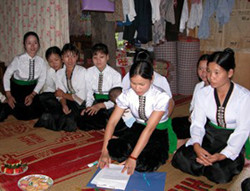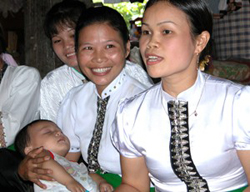News
Viet Nam: Transforming Village Economies One Woman at a Time
- 16 February 2005
News
A recent expert review of the Millennium Development Goals emphasized the critical importance of women’s empowerment in fighting poverty. Many developing countries that have shown strong economic progress are those that have championed women’s health and rights. The following feature illustrates how empowerment works at the village level, where relatively small investments can unleash women’s initiative and productivity, especially when they also have the means to control their fertility. The result is a healthier and more prosperous community.
DONG LOI, Viet Nam. Nestled in the forested uplands of northern Viet Nam, Dong Loi village sits at the end of a verdant valley. The village is surrounded by rice paddies that turn bottomland into a patchwork of emerald green. The hills are terraced with fruit trees, tea bushes and manioc. The Muong people who live in the region are mostly farmers. They grow rice, maize (corn) and tea and raise pigs and chickens. Though the Muong are an ethnic minority in Viet Nam, they comprise 60 per cent of the population in this district. Their houses, built of bamboo and thatch, rest on stilts. These “sky houses” keep out unwanted intruders, such as rats, mice and insects, and take advantage of cooling breezes.

In contrast to much of the region, which remains mired in poverty, Dong Loi village is a model of rural development: Each house has a drinking well with fresh, potable water, electricity and a vegetable garden surrounded by fruit trees. The villagers say a women’s microcredit and savings scheme has made the difference. The loan fund was set up by the local branch of the Viet Nam Women’s Union – a nationwide organization with 11 million members – in cooperation with UNFPA, the United Nations Population Fund. The group’s 30 members meet once a week to review loans and discuss other issues of shared concern.
" I think one reason we have been successful is because we combine the economic empowerment of women with access to reproductive health care and family planning. Women need both in order to thrive and help their families and communities grow. "
-- Dinh Thi Nga
“We focus on household economics, farming, animal husbandry and family health and nutrition,” says the group’s leader, Dinh Thi Nga. “I was trained by UNFPA to promote reproductive health and provide information on family planning and contraceptives.”
Nga, 32, was selected as the leader of the group because she has a high school education and a head for numbers. “Our village is pulling itself out of poverty, thanks to this project, but in many other areas in Yen Bai Province economic opportunities are limited and so is access to reproductive health,” she states. “I think one reason we have been successful is because we combine the economic empowerment of women with access to reproductive health care and family planning. Women need both in order to thrive and help their families and communities grow.”
Each of the group’s 30 members has taken out micro-loans ranging from 1 to 5 million Vietnamese Dong (approximately $75-$400). The vast majority of the loans have been used to buy pigs and chickens, which the women breed and sell, and then buy more pigs and chickens with the profits. On each sale they make a profit of $75 to $100. A percentage of the profits is invested into a collective bank account. The interest earned allows the women to finance more microcredit schemes. The extra money earned by the women keeps their children in school, buys supplies such as fertilizers and seeds, and also allows for the purchase of consumer goods such as TVs and computers.

"Because of this project, the economy of this entire village has improved a lot,” insists Nga. “We used to be struggling to make ends meet like other villages in this region, but no longer. Another reason for our success is that nearly every women in my group is practising family planning."
Averaging two children each, families in Dong Loi are smaller than those in three or four neighbouring areas. Nga attributes this, in part, to the information and services made available through the project. “Access to reproductive health means fewer, healthier children and more disposable income for families,” she says with a grin.
Nga’s neighbour agrees. Nguyen Thi Luyen joined the women’s microcredit group two years ago and has seen her family’s income rise steadily ever since she got a 5 million Dong loan to raise pigs. “I now have eight pigs, bought from the loan money. Every month and a half I sell one of them, making a profit of $100,” explains Luyen. “I have five years to pay back the loan, but I have nearly paid it off already. The extra money I have brought into the household has allowed me to start saving for my daughter’s college education, as well as buy her a computer.”
In addition, Luyen’s husband was able to expand his rice production, acquiring another parcel of land. So in addition to the pigs, the family now has three hectares of rice paddies, which produce two harvests a year and a hectare of maize, which produces one crop during the dry season, as well as an orchard and a large vegetable garden.
“We have money in the bank,” says Luyen proudly. “Before we were just living from hand to mouth.”
Luyen, 30, has only one child, her 8-year-old daughter. “We may have one more child within the next few years,” she says matter-of-factly. “But only if we are sure we can send both of our kids to the university. I want them both to make a living with their heads, not their hands, like me.” In the meantime, Luyen is using an intrauterine device to prevent a pregnancy until she’s ready.
Luyen’s attitude to planning families and making sure the children can be properly educated permeates this remote village. Explains Nga: “Nearly all of the parents of the women in my microcredit group married early and had many children – I have eight siblings – but none of us got beyond high school and we lived a very meagre existence.”
The other side of the story here is the men – they strongly support their wives’ efforts at making money. Luyen throws an arm fondly around her husband, “We are partners now and we manage finances together,” she explains with a gleam in her eye. “We make investment decisions together and support each other.”
If anything, the microcredit scheme has brought most of the families here closer together. “Our husbands were quick to notice that we were contributing a lot to the family income and supported our efforts,” said Nga. “We have changed traditions here, we have pulled this place into the modern world, and we will never go back to the old ways.”
Luyen’s husband, Dinh Ngoc, agrees. “We are all much better off than before. No one would want to turn the clock back ten years, when we toiled too much for too little.”
The project has had a profound and lasting effect on Dong Loi. “Once other neighbouring villages see what we have accomplished, they want to start their own microcredit groups,” observes Nga.
“We have learned two things from this experience,” she continues. “First, women can play important roles in community development if given the chance. And second, in order to do that we not only need access to credit and training but also to reproductive health and family planning services. The two are intimately linked to economic development.”
-- Don Hinrichsen